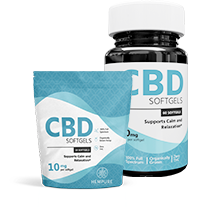Understanding Cortisol: The Stress Hormone and Its Impact on Your Health
Sabina King on Nov 23rd 2023
In the intricate symphony of hormones that regulate our body's functions, cortisol takes center stage as the "stress hormone." This essential hormone plays a pivotal role in managing our response to stress, but when its levels become chronically elevated, it can have a profound impact on our health. In this article, we'll explore the significance of cortisol, its functions, the consequences of high cortisol levels, and practical ways to lower cortisol for better overall well-being. At Hempure CBD, we are committed to holistic wellness, and understanding the role of cortisol is key to achieving it.
What Is Cortisol?
Cortisol is a steroid hormone produced by the adrenal glands, which are small, triangular glands situated on top of each kidney. It's often referred to as the "stress hormone" because one of its primary functions is to help the body respond to stress. However, cortisol plays a more extensive role in the body beyond its stress-related functions.
Functions of Cortisol:
Stress Response:
In times of stress, cortisol is released into the bloodstream to mobilize the body's energy stores, increase alertness, and prepare for a "fight or flight" response.
Metabolism:
Cortisol influences metabolism by regulating blood sugar levels, aiding in the metabolism of carbohydrates, fats, and proteins.
Immune Function:
It has anti-inflammatory properties and helps modulate the immune response.
Blood Pressure:
Cortisol helps maintain blood pressure and cardiovascular function.
Sleep-Wake Cycle:
Cortisol levels typically follow a circadian rhythm, being highest in the morning to help us wake up and lower at night to support sleep.
Anti-Inflammatory:
Cortisol suppresses the immune system's inflammatory response, making it a crucial component in the body's ability to regulate inflammation.
High Cortisol: Impact on Health
While cortisol serves essential functions in managing stress, high and sustained levels of this hormone can lead to a range of health problems. Chronic stress, whether due to work, relationships, or lifestyle, can result in persistently elevated cortisol levels, and this can have several adverse effects, including:
Weight Gain:
High cortisol levels are associated with increased appetite and cravings for high-calorie, sugary, and fatty foods. This can contribute to weight gain, especially around the abdomen, leading to the often-referenced "cortisol belly."
Cardiovascular Issues:
Chronic stress and high cortisol levels can lead to elevated blood pressure, increasing the risk of heart disease and stroke.
Sleep Disturbances:
Cortisol's circadian rhythm can be disrupted by chronic stress, making it difficult to fall asleep and stay asleep.
Suppressed Immunity:
While cortisol has anti-inflammatory properties, when chronically elevated, it can weaken the immune system, making the body more susceptible to illnesses.
Mental Health:
High cortisol levels are linked to anxiety, depression, and cognitive issues. These conditions can further exacerbate the stress response, creating a vicious cycle.
How to Lower Cortisol Levels:
Stress Reduction:
Engaging in relaxation techniques like deep breathing, meditation, and yoga can help lower cortisol levels and reduce overall stress.
Physical Activity:
Regular exercise can help lower cortisol levels. Aim for a mix of aerobic and strength training exercises.
Adequate Sleep:
Ensure you get sufficient sleep each night, as disrupted sleep patterns can lead to elevated cortisol.
Balanced Diet:
Eat a balanced diet with whole foods, including fruits, vegetables, lean proteins, and healthy fats. Avoid excessive caffeine and refined sugars.
CBD and Stress Relief:
While not a direct cortisol regulator, CBD may help alleviate stress and anxiety, potentially indirectly supporting lower cortisol levels.
Legal Disclaimer
The information provided in this article is for educational purposes only and should not be considered as medical advice or a substitute for professional medical guidance. Hempure CBD offers THC-free broad-spectrum CBD products, but our products are not intended to directly lower cortisol levels. Consult with a healthcare provider if you have concerns about cortisol or are considering changes to your wellness routine. Individual results may vary, and the Food and Drug Administration (FDA) has not evaluated these statements.
Cortisol is a vital hormone that helps us adapt to stress and maintain various bodily functions. However, chronic stress can lead to persistently elevated cortisol levels, which can negatively impact our health and well-being. Understanding the importance of managing stress and employing strategies to lower cortisol levels, such as relaxation techniques, physical activity, and maintaining a balanced diet, is crucial for achieving better overall health. While CBD may offer stress relief, it's essential to address stress management comprehensively and seek professional guidance when needed.














